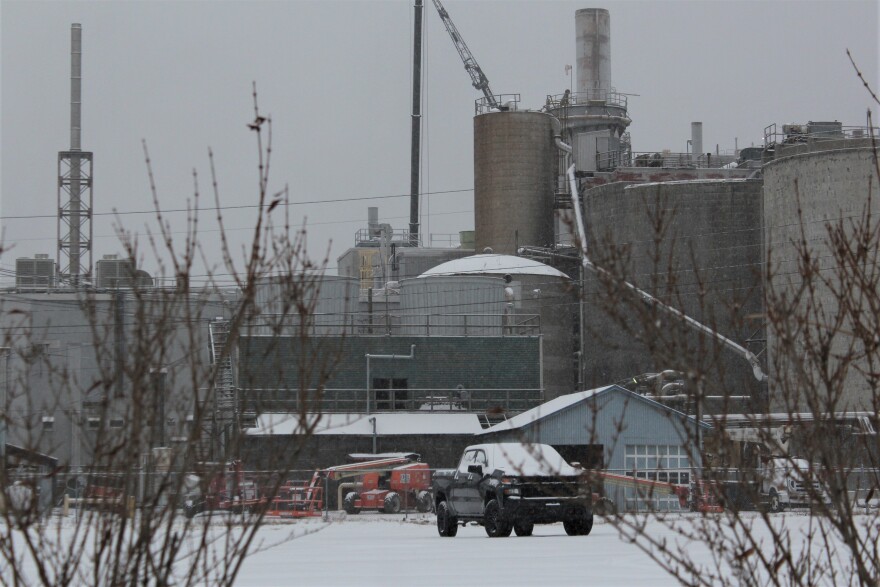The owners of the Androscoggin Mill in Jay have terminated employment for more than 170 people this year, drastically reducing their workforce after an explosion that destroyed the paper mill’s pulp digester.
Some of those who lost their jobs have said they would look for work out of state — others chose to stay.
The Jay mill is almost idyllic in a light snowfall the week before Thanksgiving. There are few trucks to disrupt the low hum from the plant, which sprawls out along the backs of the Androscoggin River.
Raymond Parlin worked here for more than three decades, until he got a phone call a few months ago.
“I got a two-day notice that I was no longer needed, over the phone,” he says. “That was the kick in the pants.”
Parlin and more than 170 other workers have been laid off this year by the mill’s owners, Pennsylvania-based Pixelle Specially Solutions. The cuts, which began following the devastating explosion of the mill’s pulp digester, have stirred speculation that the mill could close and elevated concerns about how the region could manage that kind of blow to its economy.
“If the Jay mill does close, you’re going to see taxes go up. You’re going to see people moving away. You’re going to see property taxes go up,” Parlin says. “You’re going to see a mass exodus.”
Even if the mill stays open, he says those who have lost their jobs may no longer be spending money at local gas stations, convenience stores, grocery stores and other businesses. For Parlin and others, those habits have been a major driver of the region’s economy for decades.
“Still boggles my mind that after working there 33 years, I’m not getting up and going there to work,” he says.
Parlin says he’s as much concerned about others in the region as he is his own livelihood. But despite the losses, others in the regions don’t see the cuts as catastrophic.
“There’s certainly people out there who are definitely struggling, but I see them just rising up and in faith and just pushing forward with some new ideas and dreams,” says Joel Gilbert, owner of Berry Fruit Farms in nearby Livermore Falls.

Customers pass through the doors in search of donuts, coffee and other treats, and the kitchen bustles with workers assembling pies for pick up before the holiday. Over the past decade, Gilbert and his wife have transformed a failing family orchard into a successfully diversified farm and storefront.
Berry says the lost jobs at the mill, and even the pandemic, are challenges the region can weather.
“We get tons of snow in the wintertime,” he says, “and what do we do when it snows? We get out there and we push and we get through it, you know and so on. See that same kind of spirit here.”
Bob Berry agrees. He’s a regular customer who runs an engineering and land consulting company and used to chair the area’s regional chamber of commerce.
“We have some incredibly tough people that in the past had been knocked over, kicked and dragged around. And they know how to recover from something like that,” he says.
Berry says he knows it’s difficult to be laid off, and that it can affect people’s self esteem and finances. But he says there is a community support system in the region that stands ready.
“People here are taking care of each other. They’re bringing meals to people in need. They’re giving opportunities for jobs to others in need. That’s what we do here in the Livermore Falls area. We take care of each other,” he says.
In a written response to questions about the mill’s future, Pixelle Specialty Solutions says it plans to ensure the Mill remains viable.
“The only significant revenue change relates to the shutdown of the commodity paper machine; however, this has not had a significant impact on the mill’s overall profitability,” the company wrote.
The company still employs 281 workers in Jay and plans to release its long-term goals for the mill in mid-December. Those plans won’t do much to help Parlin.
“As far as me, I’m just looking for a job,” he says with a laugh.
The Maine Department of Labor’s Rapid Response team has been working with the company and former employees to provide career resources and training and insurance options.



